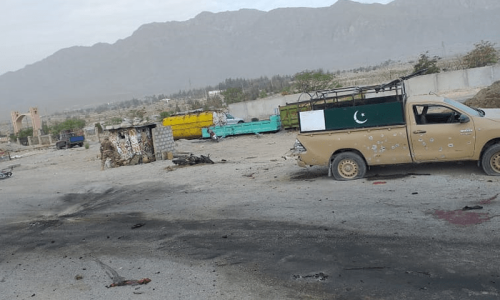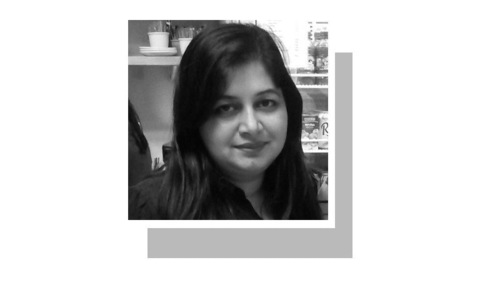CAIRO, Feb 20: Anti-regime protests in Libya spread on Sunday as a brutal crackdown killed scores of demonstrators, while thousands rallied for change in Morocco and Bahrain came under fresh pressure to introduce reforms.
In Libya protests spread closer to the capital and fresh fighting erupted in the flashpoint city of Benghazi, as Human Rights Watch said it feared a catastrophe with more than 170 people dead in an iron-fisted crackdown.
France called the government response “unacceptable” and “totally disproportionate”, and people in London and Cairo protested against Muammar Qadhafi who has ruled the oil-rich North African country for four decades.
Witnesses said by telephone that Libyan security forces clashed with protesters in the Mediterranean city of Misrata, 200km from Tripoli. Demonstrators took to the streets there to support residents of second city Benghazi, who had endured the brunt of a crackdown in eastern Libya, they said.
The witnesses said security forces, backed by “African mercenaries”, had shot into the crowds “without discrimination”.
In Benghazi, protests continued against Qadhafi’s rule amid new fighting, lawyer Mohammed Al-Mughrabi said by telephone. “Lawyers are demonstrating outside the Northern Benghazi court; there are thousands here. We have called it Tahrir Square Two,” he said of the Cairo square central to protests that brought down Egyptian president Hosni Mubarak.
A doctor at Benghazi’s Al-Jalaa hospital said in the evening that 15 bodies had been brought in since 2pm, bringing to 85 the number of fatalities there since Saturday morning.
Mughrabi said “at least 200 have been killed altogether (since the outbreak of unrest this week) but we can’t verify from hospital. We are pleading for the Red Cross to send field hospitals. We can’t take it any more.”
In London, Human Rights Watch said at least 173 people had died since Tuesday. “It’s a conservative figure based on hospital sources in eastern Libya, Benghazi and three other places,” HRW’s Tom Porteous said.
“It is a very incomplete figure and there are also a very large number of wounded. According to medical sources in Libya the wounds are indicative of heavy weapons being used against the demonstrators,” he added.
Thousands of people marched in Moroccan cities, demanding a new constitution to bring more democracy to the kingdom. Demonstrators shouted slogans calling for economic opportunity, educational reform, better health services and help in coping with rising living costs during a march on Hassan II Avenue in the capital, Rabat.
The day of demonstration was Morocco’s entree into the series of protests that have swept up North Africa and the wider Arab world after popular uprisings brought down longtime autocrats in Tunisia and Egypt.
The main target of the rallies was parliament, where many Moroccans feared their voices would not be heard. Still, the protests are likely to pressure King Mohammed VI, who has been seen as a reformer compared to his iron-fisted father, Hassan II, and who still holds absolute authority.
A sea of white banners covered Casablanca’s rain-splattered Mohammed V square, where young men in baseball caps and hoods joined young women in headscarves as well as middle-aged women in black-rimmed glasses and earrings in the diverse crowd.
Plainclothes police mingled among the demonstrators in Rabat, though police were generally discreet. Most marches took place peacefully, officials said.
However, in the city of Marrakech in central Morocco, vandals besieged a McDonald’s restaurant and a clothing store in spillover unrest, said a security official on condition of anonymity.
And in the northern city of Larache, roaming bands set upon the regional governor’s house and set fire to a gasoline station, prompting firefighters to intervene to put out the blaze, the official said.
The self-styled “February 20 movement” was largely summoned through social media like Facebook. But the open call to demonstrate also caused confusion, as disparate political and religious groups elbowed their way in and sought to reshape a protest movement to serve their own ends.
Bahrain troubles
In Bahrain, the ruling family came under increased pressure to open in-depth negotiations with the Shia-led opposition, as protesters erected more tents on the capital’s Pearl Square.
Dozens of workers also joined the protesters, and more than 1,000 medics marched on the square to demand the resignation of the health minister, whom they accused of slowing aid to protesters during a deadly police crackdown.
After nightfall, a correspondent reported thousands more people converging on the roundabout, which has been the focal point of demonstrations that have rocked the small but strategic Gulf kingdom since February 14.
An early morning raid on the square on Thursday resulted in the deaths of four people and was followed by the army deploying there. But protesters flocked back on Saturday after the army was ordered to return to base.
The heir to the throne has been tasked by his father, King Hamad, with launching a wide-reaching dialogue with the opposition.
But emboldened by Arab uprisings which have toppled the strongmen of Tunisia and Egypt since last month, the opposition has raised the stakes, demanding a “real constitutional monarchy” and the government’s resignation.
Prime Minister Sheikh Khalifa bin Salman, an uncle of the king, has held office since independence from Britain in 1971 and is disliked by the opposition.
“The government that was unable to protect its people must quit and those responsible for the massacres must be judged,” said Abdel Jalil Khalil Ibrahim, head of the parliamentary bloc of INAA, Bahrain’s main Shia opposition group.
The United States has said that National Security Adviser Tom Donilon on Saturday spoke to the crown prince, urging him to respect human rights and launch “meaningful” reforms.
Prince Salman himself acknowledged the need for reform but called for calm first. “There are clear messages from the Bahraini people... about the need for reforms,” he said in a television interview.—Agencies














































Dear visitor, the comments section is undergoing an overhaul and will return soon.